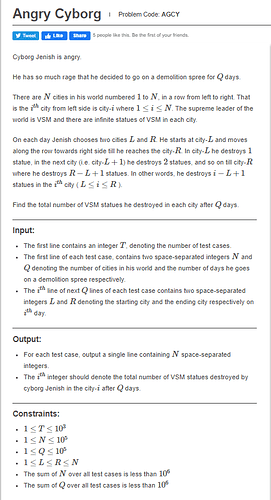i dont want answer all i want to know is the feww ways to optimize the code which i think is best possible way for a noob like me
,for your understanding im posting this question)
and here is my code …im not sure u will understand but u have 2…thats what programmers do…
#include <stdint.h>
#include <stdio.h>
#include <stdlib.h>
#include <string.h>
int main(void) {
int a,b;
scanf("%d",&a);
for(b=0;b<a;b++)
{
int d,c,x,j;
scanf("%d%d",&d,&c);
int v=d+1;
intarr=(int)calloc(v,sizeof(int));
for(x=0;x<c;x++)
{
int l,r,y,i,z;
scanf("%d%d",&l,&r);
z=r-l;
for(y=0,i=1;y<=z;y++)
{
arr[l]+=i;
l++;
i++;
}
}
for(j=1;j<=d;j++)
printf("%d ",arr[j]);
printf("\n");
}
}
hi, you’re getting TLE because your code runs in O(N^2) in worst case , with the constrait 1 <= N <= 10^5 there isn’t enough time, you should consider using sweep line
2 Likes
first of all a great thanks for your consideration and 2nd could u plz share what is sweep and how would i use it
See this article about difference arrays. This problem uses the same concept. Basically, you need to do the updates in O(1) time, and then post-process afterwards to get the final array. You can also look at my solution and see if that helps.
1 Like
This post was flagged by the community and is temporarily hidden.
int main()
{
int t;
cin>>t;
while(t--)
{
int n,q;
cin>>n>>q;
vector<int> A(n+2),B(n+2);
for(int i=0;i<q;i++)
{
int l,r;
cin>>l>>r;
A[l]-=l-1;
A[r+1]+=l-1;
B[l]++;
B[r+1]--;
}
for(int i=1;i<=n;i++)
{
B[i]+=B[i-1];
A[i]+=A[i-1];
}
for(int i=1;i<=n;i++)
{
A[i] += B[i]*i;
cout<<A[i]<<" ";
}
cout<<"\n";
}
}
I hope this helps!
You should format your code
woowwww thats the answer i was searching for…bruhhhh…literally dude…
